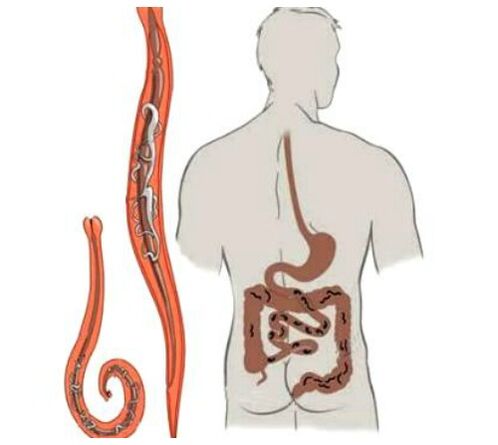The human body is an ideal environment for the habitat of pathogenic microorganisms that can influence almost all organs or system, causing a series of diseases and ailments. Among these organisms, a special place is given to the parasites that live and feed on cells and other nutrients of the "owner" body. According to medical indicators, about 90% of the population of different age categories are vectors of parasites, whose treatment and study is engaged in the medicine - parasitology section. The term "parasites" means living organisms of different types that have the capacity, established in the human body, will be introduced into the tissues of internal organs, cells, fruit juices or digested foods. Foreign bodies can penetrate our body and live there for a long time or for a whole person's life. Some types of parasites in the human body do not cause special changes, but there are those that are able to adversely affect the well -being of the "guest" and cause the development of some serious diseases. In such cases, we are talking about parasitic diseases that require immediate treatment. In medicine, parasites are called pathogenic organisms that lead a parasitic lifestyle in the human body. These include a variety of bacteria, viruses, mushrooms, as well as worms, simple invasions, unicellular, arthropods, protozoa and other species.
What are parasitic diseases?

Parasite diseases (invasions) are a large group of diseases caused by a variety of pathogenic organisms that live and multiply within a person. There are about 300 types of parasites that can influence the human body. Parasitic diseases can be caused by pathogenic bacteria and parasitic protozoa, arthropods, unicellular and other parasites or viruses. The list of parasites in the human body is quite large, but regardless of the type, almost all of them release toxins that destroy cellular structures, damage the internal organs, penetrate the lymphatic flow, in the blood, which poison the body and interrupt the work of the organs and internal systems.
Basically, pathogenic organisms consume nutrients that a person receives together with food. Perhaps this behavior of "not invited guests" explains that many people who guide the right lifestyle, monitor their health and food, do not get the desired result, since these "daermists" take away all the best, leaving a person only a small particle of useful substances. These creatures are so cunning that they are often masked as other diseases and a person can walk around the doctors for years, but do not notice a positive result in the treatment.
How do parasites fall into the human body?
Foreign organisms can penetrate the human body in different ways, but very often the infection occurs through:
- Water or ground infected with worms.
- Food products that have not passed the desired processing: poorly fried meat, fish, dirty vegetables, fruit, dairy products -caseari.
- Contact with pets or homeless people.
- Bizio of insects.
- Non -compliance with personal hygiene rules.
- Close contact with the Corriere dei Parasiti.
Many parasites that live in the human body do not have a nervous, cardiovascular or respiratory system, but their reproductive organs are able to throw hundreds of thousands of eggs accrued in the environment. The eggs and larvae of the parasites are very stable, they can be in the ground, in the water, in food or in personal items for a long time. For example, tapeworm eggs are able to resist less than 15 degrees and maintain their vital activity for 9 months. Almost all parasites have these protective mechanisms that cannot recognize and destroy the human body. That's why many parasitic diseases are difficult to diagnose. The pathogenic organisms can be found both in the intestine and in the lungs, in the blood, in the liver, in the joints, in the brain and even the eyes. The place of location of pathogenic organisms depends on their type and other characteristics, both a person and the parasite itself.
The parasites that live in the body distinguish the substances that help them live in a person for many years. They do not have a digestive system, but, however, parasites use only beneficial substances that enter the human body, which allows them to live for many years, while a person slowly loses his health, does not suspect the real reason.
Special organisms, in order to adapt to new conditions, use their "devices": pointed hooks, plates, hard hair, suction cups that constantly damage the mucous mucous membranes of organs. The parasites themselves may have a length of several millimeters at several meters, they also have the ability to secrete various toxins that poison the body as a whole, causing not only disorders in the work of the internal organs, but also to suppress immunity, destroy the beneficial bacteria of the gastrointestinal tract and overload the liver with their waste.
Signs and symptoms of parasites in the body

Parasites in the body: the symptoms of their presence can be absent or resemble the clinical manifestations of other diseases. For example, the larvae in the lungs cause symptoms of pneumonia, Pinworms - an attack of appendicitis and parasites - the biles of the bile tract or an attack on pancreatitis.
In addition, parasitic diseases are capable of frequent colds, sore throat, bronchitis and other diseases. You can suspect the presence of parasites in the human body according to the following symptoms:
- Disorders in the work of the gastrointestinal tract: diarrhea, flatulence, frequent constipation, irritable intestinal syndrome
- Joint and muscle pain
- Allergic skin reactions
- Anemia: many "cohabitants" feed on blood, which leads to the development of iron anemia deficiency
- Decrease or increase body weight
- Violations in the work of the psyche. Toxins that distinguish parasites have an destructive effect on the nervous system, causing an increased person an increased irritability, nervousness, frequent depression, panic attacks and other disorders
- Brooksism - Rattle tooth in a dream
- Intestinal dysbiosis
- Violations in the work of the immune system. Many worms and parasites reduce the production of immunoglobulin A, which over time leads to a decrease in immunity. A person is completely defenseless before viral and infectious diseases
- Inflammatory processes of the respiratory tract
- Oncological diseases. The long -term research of the parasite in the body causes a significant reduction in immunity and the degeneration of epithelial cells in cancer
In addition to the aforementioned symptoms, the parasitic invasions often damage the liver, the kidneys and the cardiovascular system, which leads to a violation of their work and the development of many diseases that are difficult to give treatments. It is important to note that all the aforementioned signs of the parasites in the human body are not an accurate confirmation of their presence. Only professional and high quality diagnostics will help determine the presence or absence of "unpublished guests".
How to recognize a parasitic disease
It is quite difficult to diagnose the presence of elmininti, especially immediately after the infection. Until recently, the only way to identify "strangers" was the duodenal sound and the analysis of the stool. The results of these studies have made it possible to determine fragments, larvae or parasitic eggs. However, these methods have not always given reliable results. At the moment, modern techniques are used to detect parasites, which allow you to identify almost all parasites.
- Calais analysis (conducted at least 3 times)
- Analysis of immunoform (Elisa)
- Elisa test
- Serological research methods
- Ultrasound examination of the internal organs (ultrasound)
- Computerized tomography
- PCR Diagnostics offers parasites analysis based on DNA analysis
The results of the research will allow not only to determine the presence of parasites in the body, but also to evaluate the conditions of the internal organs, to identify other diseases or ailments.
Parasitic disease treatment
The treatment of parasitic diseases depends on many factors: a specific type, its size, the quantity, the patient age, the body weight and other characteristics. A large assortment of drugs against parasites is provided in the pharmaceutical market, but not all drugs are able to overcome a particular parasite. It is important to note that almost all parasites violate the work of the internal organs, therefore the patient should be prescribed a complete treatment, which will be targeted not only to the destruction of the invasion, but also to the restoration of the damaged internal body.
In addition to synthetic drugs, antibiotics, against worms, antiparasitic agents that contain natural components are used in the treatment of parasites. These funds have no contraindications and are well tolerated by the human body.
Only one doctor should treat parasitic diseases after research results and determine the pathogenic body. The course of treatment, doses and names of drugs are individually prescribed for each patient. All antiparasite drugs have a large number of contraindications and side effects, so you need a doctor's consultation before their use.
Important in the treatment of parasites is the use of drugs that restore the functionality of the gastrointestinal tract, the liver, the kidneys, to help stimulate immunity, provide the body with vitamin preparations. No less than the main thing in the treatment of parasitic diseases is considered adequate diet. Patients should exclude their meat diets and dairy products -caseari, since they are an ideal environment for the propagation of parasites. It is also necessary to completely exclude the use of sugar, sweets. Nutrition should be balanced, high quality and useful for the body.
The prognosis after the treatment of parasitic diseases is substantially favorable, but in the event that large large parasites are noticed have established themselves in the body or there are significant damage to the internal organs, it is difficult to predict the result after the treatment.
Prevention of parasitic diseases

You can protect yourself from the penetration of parasites, but only if you observe simple rules. The prevention of parasites in a person's body is in:
- Compliance with the rules of personal hygiene
- Lack of contact with homeless animals
- Avoid children close to pets
- Playing with a child on the street to make sure it does not select various objects
- After playing in the sandbox, be sure to wash your hands
- During the walks, do not eat on the street, only after their hands have been washed
- Regular cleaning of the house
- Use only washed and treated vegetables, fruit
- Eat only well: fried meat
- Drink only boiled water
- If an animal needs the whole family at home once every 6 months to prevent parasitic diseases.
Respect for simple preventive rules will allow you to protect against infections with parasites, thus protecting yourself and your family from possible disorders in the work of the internal organs, which are manifested so often against the background of parasitic diseases.
















































